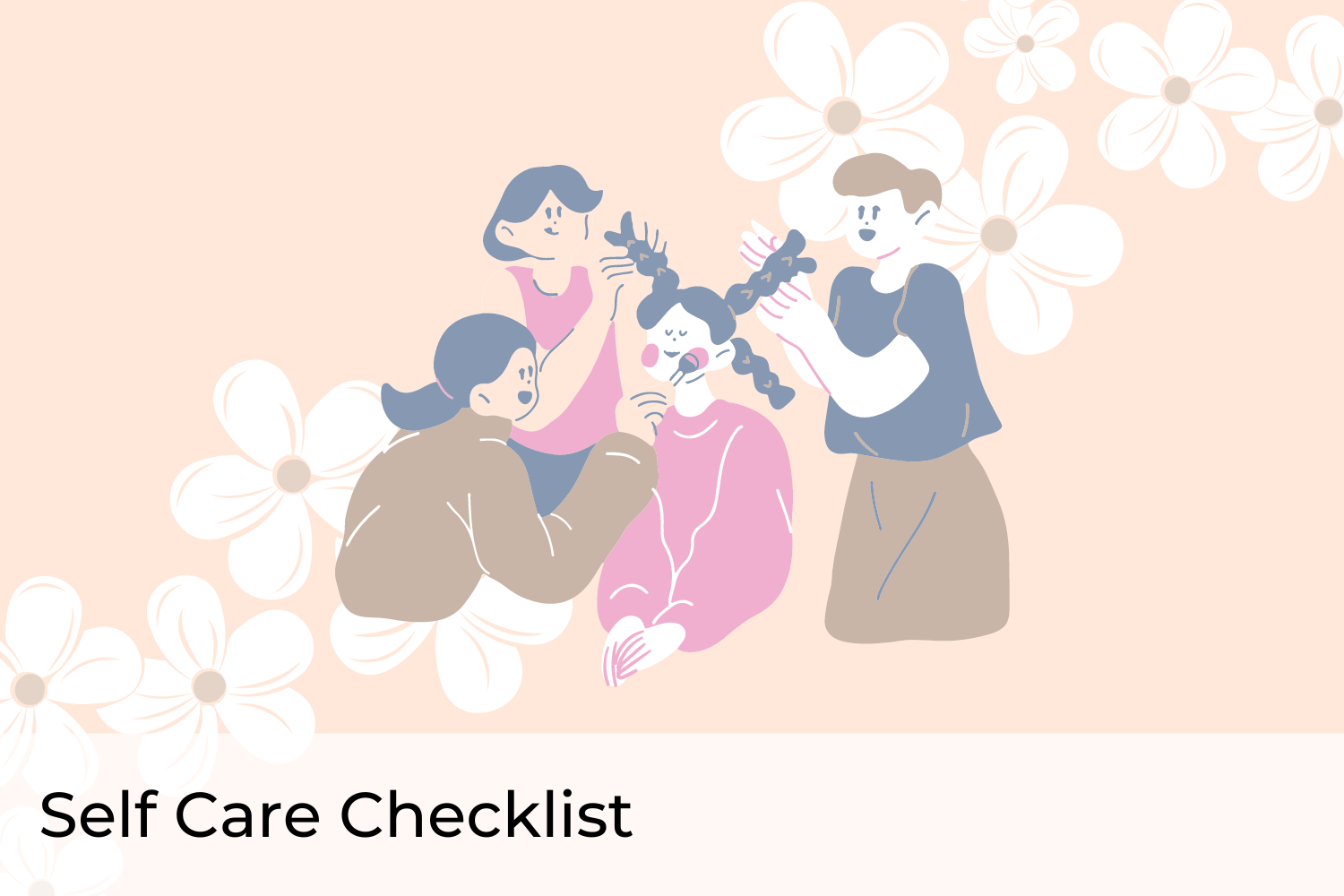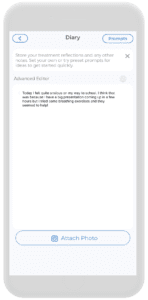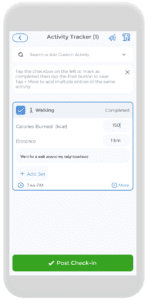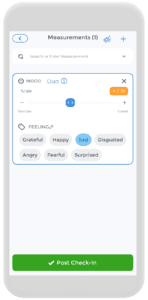
According to the WHO, approximately 14% of the global burden of disease is attributed to mental disorders including depression, alcohol and substance abuse, and anxiety1. In a world in which we are all always moving, it’s easy for us to push aside those low feelings we may be experiencing. It’s easy for us to rationalize and simply give up on trying to break a bad habit because we ‘don’t have the time’. Needless to say, it can be hard to take a step back and realize when it’s time to prioritize yourself instead of worldly matters. This is why you need a self care checklist. Self-care can be something as simple as making sure you’re drinking enough water or sleeping on time. It can be taking time away from social media or visiting your friends to just catch up.
There’s no set definition for self care and how you should go about it, however, a simple, daily self care checklist can help you get a start on taking care of yourself. Using these checklists within a healthcare app, such as CareClinic, is a great way for you to start your self care journey![1][2]
Minding your Mental Health

Over recent years, there has definitely been an active effort to destigmatize and really bring about the discussion of mental health in society. Especially with the social and cultural ideals brought from many of our racial backgrounds, the topic of mental health is not an easy one for many people to talk about. This effort to accept and openly discuss mental health disorders – including anxiety, depression and many more – is actively helping so many of us talk about how we are feeling and thus, building the strategies and tools we need to feel better. Taking care of your mental health is so important, especially in the busy and bustling world we live in!
In fact, a go-to way for most of us to reflect and express what’s on our minds is through journaling. Journaling is a well-known therapeutic tool that has been proven to lead to a greater sense of understanding, self-awareness and growth2.
The CareClinic health app offers you a comprehensive diary tool to help you make these journal entries all in one place! The app allows you to look back on entries, recognize patterns and give you a free space to simply be yourself!
Journaling Prompts
Journaling prompts are a set of questions or prompts that can be used to help guide an individual’s reflection and self-discovery through writing. These prompts can be used to explore one’s thoughts, feelings, and experiences, and can be a useful tool for promoting emotional well-being and personal growth. You may use journaling prompts as part of a treatment plan to help better understand and process your emotions and experiences, and to develop new insights into yourself. You can start off by viewing our long list of journal prompts for mental health here.[3][4]
What is Mental Health and Well-Being?
The WHO has famously stated that there can be “no health without mental health”1. With this in mind, let’s go back to the basics: what does mental health refer to? According to the CDC, mental health encompasses many facets of our well-being, including our emotional, psychological, and social states3. It is vital we take care of our mental health in order to ensure we are thinking, feeling, and acting in a beneficial and healthy manner. Additionally, mental health is not secluded or limited to only one portion of your lifetime, but in fact, is quite important at all stages of your development3.
Why is Mental Health Important?
When our mental health is good, we are equipped with the ability to completely enjoy and appreciate our life, our experiences, and the people we love4. Good mental health allows us to be creative, take on new endeavors and risks, and cope with the negative experiences that come our way. On the contrary, if you don’t take care of your mental health, getting through those tough moments in life can feel impossible and suffocating. It is vital to nurture your mental health to promote a healthy mindset for your well-being. In fact, by taking care of yourself, you can do a great deal of good in preventing and combatting mental health problems, including those associated with chronic physical illness. Take, for example, the impact of stress on your heart. If you take active steps to manage your stress well, studies have shown a positive impact on heart disease4.
How to Support your Mental Health
Many of us already have little practices we perform on a daily basis that have profound impacts on our mental states. For example, that coffee runs you make every morning before your workday is probably more therapeutic than you think. These little parts of your routine can be classified under the umbrella term of self care. Self care practices are arguably one of the best ways for you to prioritize yourself and your mental health.
Nowadays, practicing self care is made even easier with the presence of self care checklists. For example, have you ever been scrolling through TikTok and seen a video of someone tracking their water intake in a beautifully laid-out journal? Or maybe they’re recording the amount of physical exercise they got in a day across a monthly calendar. Regardless, these sorts of daily checklists play a huge part in what we have come to define as self care.[5][6][7]
What is Self Care?
Within the realm of public health, self-care is defined as activities in which an individual partakes for the purpose of promoting their own health, limiting disease, and restoring their well-being5. Most of these activities are generally taken without medical advice or assistance and are done on the terms of the individuals themselves5. Don’t take this the wrong way though – self care activities are more often beneficial than they are not and are a great way to start prioritizing yourself.[8]
What goes in a self care checklist?
There are a variety of topics you may choose to include in your self care checklist. These may range from daily living activities such as nutrition, water and exercise, to more relaxing and therapeutic hobbies, such as reading, writing or meditation6. It is important to note that there really is no one-size-fits-all checklist that will include only aspects that are beneficial to you while ignoring the ones that aren’t. Each person is different in what works best in promoting their mind and body wellness. Thus, their self care habits may look different too6,7.
Your Physical Needs
Sleep
We all need sleep. In fact, if we don’t get enough sleep, it can quickly catch up to us and impact our performance, attention, and even our happiness6. Not getting good enough quality sleep regularly has indeed been shown to affect your mood and of course, your physical health6. Keeping track of when and how much sleep you get in a self care checklist may improve your sleep, and thus, your well-being as a whole!
Exercise

If you don’t really like to hit the gym, chances are exercising can feel like a real chore6. The trick to ensuring you get enough physical activity is to make it fun for you. Dancing, taking a walk, hiking – these are all various forms of exercise that can help contribute to ensuring your meet the recommended guideline of 150 minutes/week of physical activity6. Additionally, adding this facet to your self care checklist can help keep you accountable and consistent.
To track your physical activity at a more detailed level, you may even decide to use the CareClinic activity tracker! This tool allows you to specify what type of physical activity you are partaking in, the time, and any other notes you feel are relevant to your exercise and health. Over time, by tracking your physical activity through CareClinic, additional correlation tools may allow you to clearly see the impact being made on your physical, and even mental, well-being!
Nutrition
Nutrition is a pretty broad term, and you may be wondering why something so obvious would need to be included in terms of your self care. The sad reality is that most of us don’t realize the impact of skipping breakfast or having takeout every day until the consequences begin to catch up to us. All of our lives are busy and just having a section on your checklist for something as simple as ‘I ate 3 meals today’ can make a big difference in the long run6!
Your Mental Needs
How to Reduce Stress
Our stress levels are a key player when it comes to the maintenance of our mental health. So much of the time in our day is spent worrying about the next big deadline or our evening plans. When prioritizing yourself care, finding time to unwind and self-reflect can help you combat your stress and keep you feeling motivated6,7! Scheduling an activity such as a walk, or writing a page in your journal, or evening reading for 30 minutes – these are all great ways to decrease your stress levels and have you feeling happier and healthier in no time!
Your Emotional Well-being
When it comes to self care, I find that most people skip over the aspect of emotional self-care. It seems to be a concept we often overlook when taking care of ourselves, so what do I really mean when I say emotional well-being? Emotional self care refers to surrounding yourself with people, things and hobbies that make you feel good7. People whom you love and who make you feel like a better version of yourself. Your favorite books or movies. Allowing yourself to cry. These are all different pieces of information you may choose to include in your daily self care checklist to ensure you’re taking care of your emotional well-being7.
Cognitive Abilities: Time to try something new!
It’s always a great idea to expand and strengthen your mind6. How do you do this? Well, to boost your cognitive skills, you may decide to take up a new subject. For example, maybe you finally decide to take the Spanish classes you’ve been wanting to, or maybe you enroll in a dance class at your local community center.
Other mental exercises can include something as simple as reading to brain teasers such as crosswords or sudoku. In fact, a good crossword in the morning may set up your day for success as recent research has shown that playing brain games can help your concentration improve6. Regardless, adding a box to your checklist designated to one of these types of activities can ensure your cognitive abilities are included in your self-care journey.
What else could you include?
Like I’ve said already, each person’s self care checklist will look a little different depending on your lifestyle and what works best for you6,7! Feel free to explore other inclusions you feel are relevant. For example, maybe you want to include a section on your skincare as that may be something you’re currently working on. Maybe you have trouble sticking to your work hours and tend to take on extra responsibilities. In this case, you might decide to include a section on if you feel you have achieved a work-life balance on a given day.
On a more clinical note, maybe you are someone who struggles with a specific mental illness and wants to target your self care activities. In this case, maybe you decide to create a self care checklist for anxiety, including things like meditation, social engagement and practicing mindfulness. Moreover, your self-care checklists can be targeted not just for anxiety, but also for depression, ADHD and many more6,7. No matter what you decide to include or not include, the goal is for you to create a comprehensive list of things to help you feel your best at the end of each day![9][10][11][12][13]
Using a Daily Self-Care Checklist

Using a self-care checklist is made easy and accessible in today’s world. Finding a good base checklist can be as easy as Google. More often than not, a good checklist will be readily available for you in pdf form! If an online pdf isn’t the right format for you, you may instead decide to find a printable pdf and use that instead.
Perhaps you might find that writing out a checklist is the best form for you. Whether you decide to use an online version, a printable pdf or a handwritten checklist, the most important thing is to have your checklist ready to go for consistent and accessible use.
When using your checklist, consistency really is key. Pick a time at the end of your day and analyze what you were able to accomplish from your list of self care activities. Additionally, take some time to analyze patterns across your recent days and make note of some of the things you find are working and what you find you may be struggling with. From there, implementing a more targeted approach – such as getting a timed water bottle to improve your hydration – will become easier and you’ll be reaching your goals in no time!
The Final Steps of Your Self-Care Checklist
Self care may seem like a daunting task to begin, despite how much you really want to. It’s not easy to find the motivation to go out at take a walk, but the gratification of checking it off your list for the day may make it worth it.
CareClinic has a variety of trackers – including mood, sleep, and hydration trackers – along with visual analysis tools, that can help with understanding how your self care journey progresses and the impact it is having on your well-being.
Additionally, if you decide to create a more targeted checklist for anxiety as an example, the app allows you to create a separate care plan with a customized check-in page to make tracking easy and convenient. CareClinic is here to ensure you feel your best by prioritizing your mental and physical well-being through self care![14]
References
- “Key messages”. https://www.who.int/key-messages
- “Global, regional, and national burden of 12 mental disorders in 204 countries and territories, 1990–2019: a systematic analysis for the Global Burden of Disease Study 2019 – The Lancet Psychiatry”. https://www.thelancet.com/journals/lanpsy/article/PIIS2215-0366%2821%2900395-3/fulltext
- “The Power of Journaling: What Science Says About the Benefits for Mental Health and Well-Being – Child Mind Institute”. https://childmind.org/blog/the-power-of-journaling/
- “10 daily journal prompts to boost your mental health — Calm Blog”. https://www.calm.com/blog/journal-prompts-for-mental-health
- ““There is no Health without Mental Health”, Message on World Mental Health Day, 10 October 2011”. https://unis.unvienna.org/unis/en/pressrels/2011/unissgsm296.html
- “Mental Health | Mental Health | CDC”. https://www.cdc.gov/mental-health/index.html
- “No health without mental health | Mental Health Foundation”. https://www.mentalhealth.org.uk/about-us/no-health-without-mental-health
- “Self-care for health and well-being”. https://www.who.int/health-topics/self-care
- “Why Sleep Is the Key to Living Longer”. https://time.com/7160802/sleep-longevity-live-longer-health/
- “9 Things You Should Do for Your Brain Health Every Day, According to Neurologists”. https://time.com/7081407/brain-health-neurologist-tips/
- “The Role of Nutrition and Exercise in Mental Health: How to Improve Your Mood and Well-being – drkelkarhospital”. https://drkelkarhospital.com/the-role-of-nutrition-and-exercise-in-mental-health-how-to-improve-your-mood/
- “Beyond calories: an integrated approach to promote health, longevity and well-being – PMC”. https://pmc.ncbi.nlm.nih.gov/articles/PMC5108694/
- “The 7 Self-Care Pillars: A complete Guide and Checklist – The Self-Care Sphere”. https://theselfcaresphere.com/the-7-self-care-pillars-a-complete-guide-and-checklist/
- “Self-Care Checklists: The Key to a Healthy and Happy Life | by Dineanddiet | Medium”. https://medium.com/%40dineanddiet/self-care-checklists-the-key-to-a-healthy-and-happy-life-17d9e3f89bee


